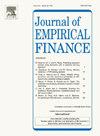为什么没有杠杆的公司仍然会有杠杆和波动反馈效应?
IF 2.4
2区 经济学
Q2 BUSINESS, FINANCE
引用次数: 0
摘要
布莱克(Black,1976 年)和克里斯蒂(Christie,1982 年)提出的杠杆效应假说认为,债务的时间序列变化会导致股票收益波动与股票收益之间的反向关系。Hasanhodzic 和 Lo(2019)在无债务公司的新样本中检验了这一假说,但他们仍然发现了反向关系,这促使他们支持将波动性反馈作为一种替代方案。根据资产定价文献中关于风险收益关系的标准假设,我解释了为什么全股权融资企业的股票收益仍会与债务融资企业的股票收益具有同等的杠杆效应,以及为什么在企业层面没有债务对杠杆和波动率反馈假设没有影响。本文章由计算机程序翻译,如有差异,请以英文原文为准。
Why do firms with no leverage still have leverage and volatility feedback effects?
The leverage effect hypothesis of Black (1976) and Christie (1982) posits that time-series variation in debt causes an inverse relation between stock return volatility and stock returns. Hasanhodzic and Lo (2019) test this hypothesis in a novel sample of firms with no debt and yet they still find an inverse relation, motivating them to espouse volatility feedback as an alternative. Under standard assumptions governing the risk-return relation from the asset pricing literature, I explain why the stock returns of all-equity-financed firms will still have leverage effects on par with those of debt-financed firms and why the absence of debt at the firm level has no bearing on the leverage and volatility feedback hypotheses.
求助全文
通过发布文献求助,成功后即可免费获取论文全文。
去求助
来源期刊

Journal of Empirical Finance
Multiple-
CiteScore
3.40
自引率
3.80%
发文量
59
期刊介绍:
The Journal of Empirical Finance is a financial economics journal whose aim is to publish high quality articles in empirical finance. Empirical finance is interpreted broadly to include any type of empirical work in financial economics, financial econometrics, and also theoretical work with clear empirical implications, even when there is no empirical analysis. The Journal welcomes articles in all fields of finance, such as asset pricing, corporate finance, financial econometrics, banking, international finance, microstructure, behavioural finance, etc. The Editorial Team is willing to take risks on innovative research, controversial papers, and unusual approaches. We are also particularly interested in work produced by young scholars. The composition of the editorial board reflects such goals.
 求助内容:
求助内容: 应助结果提醒方式:
应助结果提醒方式:


